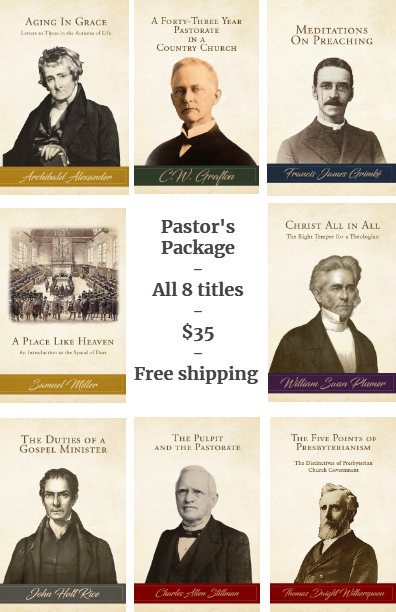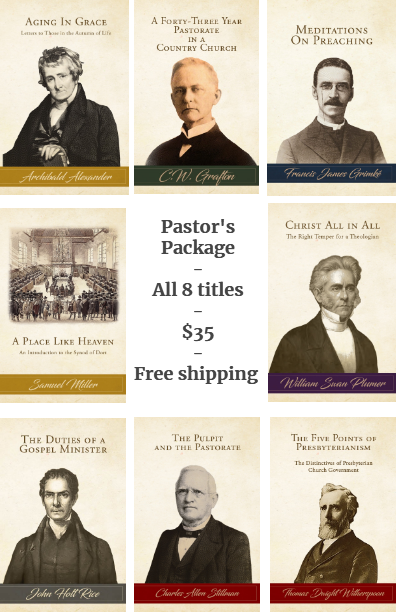(Receive our blog posts in your email by clicking here. If the author links in this post are broken, please visit our Free PDF Library and click on the author’s page directly.)
We have been blogging through C. C. Jones’ book The History of the Church of Christ slowly but surely (find past posts here). The design of the book is “to unfold the institutions and doctrines and ordinances of the Church as they are revealed throughout the entire Scriptures, at the precise time that they first appear in the History…” (20). Thus in chapter 2, he examines the creation ordinance of marriage.
He lays down a large number of passages throughout the Bible that speak to the way God watched over the marriage relationship, forbade violations of its purity, regulated it strictly when polygamy blemished it, and restored it to its original form in the days of Jesus Christ. God’s providence keeps in step with His word, ensuring that there is an equitable number of males and females at marriageable ages, and stretching forth his hand against those who would transgress his law. Marriage shows itself written on the hearts of men, as all nations “attach a peculiar value and sacredness to it” (21).
The ordinance of marriage is the foundation of all societies and governments, and it “partakes also of the nature of a civil institution,” as seen by God’s regulations regarding it when the Church was a state under the old covenant. Jones notes that these laws have been adopted to some extent in all civilized and Christianized nations, and that any attempt to contravene God’s laws have only led to misery, for such efforts are “a direct assault upon the very nature of man itself, a blow levelled at his social peace and prosperity, an attach upon the order and purity of society, and an infidel trampling under foot of the law of God, which will meet with rebuke and sore punishment at [God’s] hands” (22). He reminds us of the sobering words of I Timothy 4:1-3 that class forbidding marriage with “doctrines of demons,” and points out the Roman Catholics as the most glaring offenders in this respect.
Jones sees marriage as “the most tender, perfect, and intimate union formed among mortals,” from the following reasons: 1) the peculiar manner of Eve’s creation; 2) from Adam’s reception of Eve from the hand of God; 3) from the union being voluntary, founded upon mutual esteem and affection – which “ an inalienable right in, and possession of each other’s persons, and of each other’s services and property, for mutual enjoyment, comfort, and support, while spared together in life” (23); and 4) from the union being compared to the union of Christ and the Church.
Marriage is not obligatory on any but those to whom it is given, but it is permanent upon all who enter it – neither “difference of age, or standing, or from contrariety of temper, or intemperance, or feebleness of health, or loss of reason, or for unbelief, or heresy, or schism, or diversity of faith, [may] ever be admitted to effect a dissolution” (24). Jones comments upon Paul’s words in I Corinthians 7, which some suppose are a discouragement to marriage. He disagrees, for he deems that verse 26 makes it clear that Paul was dealing with a specific distress that made marriage optional for that season. Yet even during that time marriage was not a sin (vs. 28), and was even doing well (vs. 38), and Paul’s aim in speaking as he did was to prevent those in that day from “trouble in the flesh” (vs. 28).
Jones comments on the laws of consanguinity and affinity found in Leviticus 18 and 20, as well as the exception that a man marry his dead brother’s wife, so as to raise up an offspring to his brother. Jones ties the latter to the coming of the Christ, explaining that its design was “to preserve distinct the families of the descendants of Abraham, and so render perfect and clear the genealogy of our Lord, and the fulfillment of the promise that He should be of the seed of Abraham” (25). Once Christ had come, there was no longer a necessity for the exception. But the laws of consanguinity and affinity, Jones argues, were not ceremonial and thus temporary. His remarks are worth citing in full, given the unfamiliarity of the church today with the Scriptural basis of Westminster Confession of Faith 24.4:
[The laws of consanguinity and affinity] form no part of the ceremonial law instituted by Moses, but is wholly moral in its origin and design, which were to preserve the people of God from the corrupt practices of the heathen, as expressly stated in Leviticus 18:24-30 and 20:22, 23; and to furnish the Church in all ages with a law regulating a matter of so great importance, which otherwise would have been left in confusion and perplexity. In this light is the law interpreted and applied in the New Testament, and is thereby acknowledged and established as the law of the Church under the New as well as the Old Dispensation. The reference made is by the Apostle Paul in 1 Cor. 5:1. He brands the connection, the marriage of a son with a stepmother, as incest, and says it is such incest “as is not so much as named among the Gentiles,” and condemns the transgressor to excommunication (verses 2-5)! By what law? The law of nature? Nay, verily, but by the law of God, given to His Church ages before. The prohibition of this very connection is found in Leviticus 18:8, and 20:11; and moreover this very case is singled out and cursed in the curses afterwards to be uttered from Mount Ebal. Deuteronomy 27:20. If the law in Leviticus is not the law of God’s Church, then has the Church no law at all upon so important a matter! And who can give a reason why the Lord should give a law regulating marriage to His Church of old, and of authority for centuries, and a law to distinguish His people from the heathen, and to preserve them from their pollutions, and now, in these latter days of brighter glory and perfection in that Church, that that law should be set aside! The propriety and necessity of the law are as strong as ever. The Church under the Old and the New Dispensation is one and the same, and this law once given has never been repealed, but confirmed by an Apostle, and consequently remains in force. (26-27)
Jones closes the chapter by observing the ends of marriage: to promote 1) the happiness of mankind; 2) the legitimate propagation of our species; 3) the perpetuation of a pure, holy, and honorable seed in the Church; and 4) the purity of life and manners on the earth. One of the purposes that marriage does not have is to be a sacrament, declares Jones. First, a sacrament is for the Church alone – but marriage is common to all mankind. Second, a sacrament has an outward sign of an inward grace – marriage has neither. Third, a sacrament represents Christ and the benefits of the new covenant – marriage represents neither in a sacramental sense, argues Jones, notwithstanding Paul’s words in Ephesians 5:22-23. These verses no more make marriage a sacrament than John 15:1-6 makes a vine a sacrament, or any other passage that compares the relationship between Jesus and His people to some created thing makes that thing a sacrament. Jones notes the irony of Roman Catholics asserting that marriage is a sacrament, but then excluding their priests from it, and stigmatizing it as unclean. A sacrament is for all God’s people, and none may be excluded.
With this Jones lays down his pen on the topic of marriage, and readies it to reflect on the covenant of works in the garden of Eden. To be continued…


